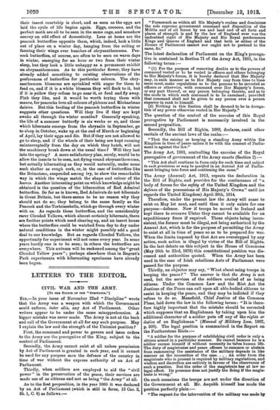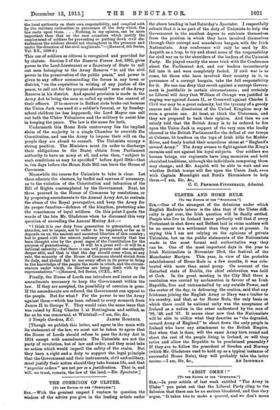LETTERS TO THE EDITOR.
CIVIL WAR AND THE ARMY.
[To THZ EDITOR OF THE " 81.13CTATOR..1
SIR,—In your issue of November 22nd " Discipline" wrote that the Army was a weapon with which the Government could enforce, inter alia, any Act of Parliament. Other writers appear to be under the same misapprehension. A. bigger mistake was never made. The Army is not at the beck and call of the Government at all for any such purpose. May I explain the law and the strength of the Unionist position ?
First, the command and power to govern and issue orders to the Army are the prerogative of the King, subject to the control of Parliament.
Secondly, the Army cannot exist at all unless permission by Act of Parliament is granted in each year, and it cannot be used for any purpose save the defence of the country in time of war without the express authority of an Act of Parliament.
Thirdly, when soldiers are employed to aid the " civil power " in the preservation of the peace, their services are made use of as citizens and not as being " the Army " at all.
As to the first proposition, in the year 1660 it was declared by an Act of Parliament (which is still in force, 13 Car. 2, St. 1, C. 6) as follows
"Forasmuch as within all His Majesty's realms and dominions the sole supreme government command and disposition of the Militia and of all forces by sea and land and of all forts and places of strength is and by the law of England ever was the undoubted right of His Majesty and His Royal predecessors Kings and Queens of England and that both or either of the Houses of Parliament cannot nor ought not to pretend to the same, &c."
The latest declaration of Parliament on the King's preroga..
tive is contained in Section 71 of the Army Act, 1881, in the following terms :-
" (1) For the purpose of removing doubts as to the powers of command vested or to be vested in officers and others belonging to Her Majesty's forces, it is hereby declared that Her Majesty may, in such manner as to Her Majesty may from time to time seem meet, make regulations as to the persons to be invested as officers or otherwise, with command over Her Majesty's forces, or any part thereof, or any person belonging thereto, and as to the mode in which such command is to be exercised ; provided that command shall not be given to any person over a person superior in rank to himself.
(2) Nothing in this Section shall be deemed to be in deroga- tion of any power otherwise vested in Her Majesty."
The question of the control of the exercise of this Royal prerogative by Parliament is necessarily involved in the second proposition.
Secondly, the Bill of Rights, 1688, declares, amid other recitals of the ancient laws of the realm :—
" That the raising or keeping a standing Army within the Kingdom in time of peace unless it be with the consent of Parlia- ment is against the law."
The Army Act, 1881, controlling the exercise of the Royal prerogative of government of the Army enacts (Section 2) :—
" This Act shall continue in force only for such time and subject to such provisions as may be specified in an Annual Act of Parlia- ment bringing into force and continuing the same."
The Army (Annual) Act, 1913, repeats the declaration in the Bill of Rights, and provides for the continuance of "a
body of forces for the safety of the United Kingdom and the
defence of the possessions of His Majesty's Crown" until (as regards the United Kingdom) April 30th, 1914.
Therefore, under the present law the Army will cease to exist on May 1st next, and until then it only exists for one purpose—defence. Now if troops be moved to Ireland and kept there to overawe Ulster they cannot be available for an expeditionary force if required. These objects being incon- sistent, the former must be illegal, not being authorized by the Annual Act, which is for the purpose of permitting the Army to exist at all in time of peace so as to be prepared for war.
When the limits imposed by that Act are overstepped by any action, such action is illegal by virtue of the Bill of Rights. In the last debate on this subject in the House of Commons (May 20th to 23rd, 1878) this constitutional position was dis- cussed and authorities quoted. When the Army has been used in the case of Irish rebellions Acts of Parliament were passed for the purpose.
Thirdly, an objector may say, "What about using troops in keeping the peace ? " The answer is that the Army is not used, but the services of the soldiers availed of as being
citizens. Under the Common Law and the Riot Act the Justices of the Peace can call upon all able-bodied citizens to assist in keeping the peace, and they may be indicted if they refuse to do so. Mansfield, Chief Justice of the Common Pleas, laid down the law in the following terms : "It is there- fore highly important that the mistake should be corrected which supposes that an Englishman by taking upon him the additional character of a soldier puts off any of the rights or duties of an Englishman" (Manual of Military Law, 1907, p. 208). The legal position is summarized in the Report on the Featherstone Riots :— "A soldier for the purpose of establishing civil order is only a citizen armed in a particular manner. He cannot because he is a soldier excuse himself if without necessity he takes human life. The duty of magistrates and peace officers to summon or abstain from summoning the assistance of the military depends in like manner on the necessities of the case. . . . An order from the magistrate who is present is required by military regulations, and wisdom and discretion are entirely in favour of the observance of such a practice. But the order of the magistrate has at law no legal effect. Its presence does not justify the firing if the magis- trate is wrong."
On such occasions the troops are not under the direction of the Government at all. Mr. Asquith himself has made the position perfectly plain :— " ihe request for the intervention of the military was made by the local authority on their own responsibility, and complied with by the military authorities in pursuance of the duty which the law casts upon them. . . . Nothing, in my opinion, can be more important than that on the rare occasions which justify the employment of soldiers for preventing or putting down civil dis- turbances the soldiers should act throughout in the presence and under the direction of the civil magistrate."—(Hansard, 4th Series, Vol. XX., 1308-9.)
This use of soldiers as citizens is recognized and provided for by statute. Section 5 of the Reserve Forces Act, 1882, gives power to the Lord-Lieutenant or a Secretary of State to call out men belonging to the Army Reserve "to aid the civil power in the preservation of the public peace," and power is given to any officer commanding the forces in any town or district, "on the requisition in writing of any justice of the peace, to call out for the purpose aforesaid" men of the Army Reserve in his district. And special provision is made in the Army Act to bring the men so called up under the control of their officers. If to-morrow in Belfast riots broke out because the Union Jack was used at a soldier's funeral, or by Sunday- school children (as has happened), the Lord Mayor can call out both the Ulster Volunteers and the military to assist him in keeping the peace. The law is the same for both.
Underneath this Home Rule controversy lies the implied claim of the majority in a single Chamber to override the Constitution, and use the Army to impose their will on the people they are afraid to consult. The Unionists occupy a strong position. The Ministers must (in order to discharge their obligations to the State) obtain from Parliament authority to have an army at all, and even then, " subject to such conditions as may be specified " before April 30th—that is, ten days before the Home Rule Bill can leave the House of Corn mons.
Meanwhile the course for Unionists to take is clear. Let them educate the electors, by leaflet and canvass if necessary, as to the violation of the Constitution and infraction of the Bill of Rights contemplated by the Government. Next, let them proceed in the House of Commons by resolutions, or by proposing amendments to the Annual Army Act, to restrain the abuse of the Royal prerogative, and keep the Army for its proper function—defence of the kingdom, protecting also the consciences of loyal soldiers. On this point I quote the words of the late Mr. Gladstone when he discussed this very question of exceeding the Annual Mutiny Act :-
" I think it is our duty from generation to generation, not to abandon, not to impair, not to suffer to be impaired, so far as it depends on us, the ancient and ancestral liberties of this country ; but to guard with the utmost jealousy every security that has been thought wise by the great sages of the Constitution for the purpose of guaranteeing. . . . It will be a great evil—it will be a national calamity—but there is one evil greater and one calamity deeper still, and that is that the day should come when, at any rate, the minority of the House of Commons should shrink from its duty, and should fail to use every effort in its power to bring to the knowledge of the people the mode in which, and the circum- stances under which, its liberties are being dealt with by its representatives."—(Hansard, 3rd Series, CCXL., 407.) Finally, the House of Lords can introduce and insist on the amendments necessary to keep the Government within the law. If they are accepted, the possibility of coercion is gone. If the amendments are refused, the Government can appeal to the people. But for what P For the power to use the Army against them—which has been refused to every monarch from James n. to George V. They would raise the same issue that was raised by King Charles I. at Nottingham and settled, as far as he was concerned, at Whitehall.—I am, Sir, &c.,
[Though we publish this letter, and agree in the main with its statement of the law, we must not be taken to agree that the House of Lords should refuse to pass the Army Act in 1914 except with amendments. The Unionists are not the party of revolution, but of law and order, and they must take no action which would imperil the safety of the realm. But they have a right and a duty to support the legal principle that the Government and their instruments, civil and military, must justify their action should they take human life, and that "superior orders" are not per as a justification. That is, and will, we trust, remain, the law of the land.—En. Spectator.]



























































 Previous page
Previous page